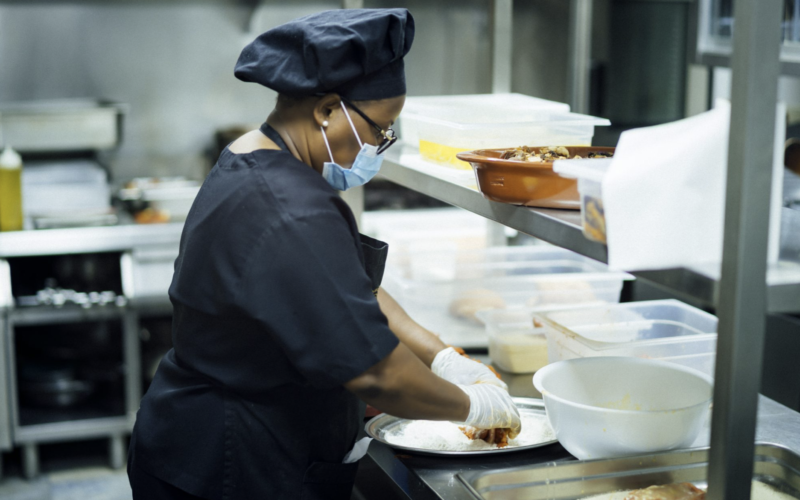By Kristen Hawley | FoodAndWine.Com
Troy Warren for CNT
Some business owners have seen their approved grants rescinded due to lawsuits and lack of additional action from Congress.
The Restaurant Revitalization Fund has been depleted. As of June 30, the program had distributed all $28.6 billion to 105,000 restaurants, according to an email to business owners from the Small Business Administration (SBA). An online portal that served as an information and application hub for the program will close on July 14, leaving hundreds of thousands of restaurants out of the grant program. Thousands of others lost out on aid they were expecting thanks to lawsuits backed by conservative groups.
The $28.6 billion Restaurant Revitalization Fund was a popular program, offering grants to independent restaurants to help cover business losses due to the COVID-19 pandemic. The SBA, tasked with managing the relief funds, announced on May 10 that 16,000 businesses were approved for grants totaling $2 billion in just the first week. Thousands more restaurants received approval notices in the weeks following and were told to expect funds in their bank account within seven business days.
Business owners who spent months waiting for relief eagerly moved forward: The owners of a small wine bar in Brooklyn told their landlord that they’d soon pay the 15 months of back rent they owed. A restaurant group in Detroit gave all of its workers a week off, fully paid. A small restaurant in Los Angeles hired a headhunter to recruit two senior employees to help grow the business. The owner of a weddings and events business in New York City contacted couples to say she would soon be able to refund some of the money they put down as a deposit on their canceled 2020 weddings.
These business owners had their Restaurant Revitalization Fund grant applications approved as part of a program that prioritized traditionally underserved owners — women, veterans, people of color, and other disadvantaged groups. Weeks later, approvals in-hand, they learned that the relief funds they were promised weren’t coming. They weren’t alone — Over 3,000 businesses received notices that their grants had been canceled.
“It seemed too good to be true, and it turned out that that was the case,” said Tom Pisha-Duffly, chef and co-owner of Oma’s Hideaway in Portland, Oregon. He and his partners learned in late June that the restaurant, which opened in 2020 during the pandemic, wouldn’t receive the grant money it was promised.
“As a small, independent business that is partially owned by women and people of color, I think we’re very un-used to pleasant news from a bank. We were like, ‘What? We’re going to be recipients of this government funding? We’ve never been in that position before,” said Mariah Pisha-Duffly, a co-owner.
The Restaurant Revitalization Fund was introduced as part of President Biden’s American Rescue Plan, funneling billions directly to independent restaurants. The first three weeks of the program prioritized certain groups of business owners in the name of equity. In an April interview with Food & Wine, SBA Administrator Isabella Casillas Guzman explained the importance of that structure. “This is critical in the first-come first-served program in order to ensure that those businesses are able to apply,” she said. As a report from The Counter noted, this sort of prioritization is not atypical for the SBA which has a history of supporting programs that target disadvantaged groups of business owners.
But in late May, a number of federal lawsuits backed by conservative groupsincluding one led by former Trump advisor Stephen Miller, derailed the fund’s disbursement. The lawsuits, representing the interests of a handful of restaurants owned and operated by white men, alleged discrimination because the application process prioritized applications based on race and sex.
Federal judges in Texas and Tennessee agreed, and the SBA halted all payments to priority applicants. Three restaurants involved in the high-profile suits had their applications processed and received grants totaling close to $933,000. According to a court filing, the last priority applications were processed on May 27 and the rest of the money in the fund was re-allocated to non-priority applicants.
As courts debated the fund’s fate, thousands of restaurants were left in limbo. Lindsay Mescher, owner of Greenhouse Cafe in Lebanon, Ohio said she started to get nervous after eight or nine days passed with no bank deposit. She called the SBA’s hotline and was told the money was on its way. Instead, the next day, she received an email stating that her grant was canceled.
“You know not to depend on stuff until it’s in your account but when you get an official letter, an official approval in a grant program from the government you have reason to believe you can count on it,” she said. She’s worried for the future of her restaurant, one of the only places in her area that serves locally sourced food at accessible prices. “We’re in a food desert,” she said.
Other restaurant owners report a similar experience: After days of calls, emails, and messages through the SBA portal and reassurance that the money was still coming, the grants were rescinded.
The SBA responded to a request for this article but has not yet shared the total number of businesses that have had their grants revoked. In mid-June, the SBA told nearly 3,000 restaurants that they would not receive grant money they were promised because of the federal lawsuits. A little over a week later, more restaurant owners received emails telling them that their previously approved grants would not be disbursed. Some of these emails indicated an application had been denied and that the SBA would no longer consider it.
Sean Kennedy, executive vice president for public affairs at the National Restaurant Association, said that all priority group applicants who will not receive promised grant money have been notified. But they aren’t the only restaurant owners waiting for much-needed government aid.
“There are $50 billion of applications that are pending right now that are not going to be funded, because the federal dollars aren’t there,” he said. “And these are men and women from all walks of life who share a passion for serving in the restaurant industry, and their applications are valid. They’re legitimate and they deserve to be funded.”
The Restaurant Revitalization Fund was practically destined to be oversubscribed. In our April interview, Administrator Guzman said she expected the money to run out and encouraged all eligible businesses — in both the priority and non-priority groups — to apply as soon as possible, in part to help demonstrate need. The fund itself was based on the RESTAURANTS Act, a congressional proposal that sought $120 billion in direct aid to independent restaurants.
Members of Congress have introduced an effort to refill the fund with an additional $60 billion, though some operators worry that a re-up of funds won’t be prioritized as pandemic restrictions are lifted and restaurants resume service at full capacity.
In a recent Zoom call with independent restaurant operators, Erika Polmar, executive director of the Independent Restaurant Coalition (IRC) said that it’s unlikely the measure will pass as a standalone bill, but instead might be added to a reconciliation package like the bipartisan infrastructure package, potentially in July. This only happens if legislators — Republican senators, especially — are motivated to, act, she said. The IRC offers several resources on its site including a tool to quickly contact elected representatives.
“The simplest solution to all of it, all of the problems with the lawsuits and everything else goes away if you refill the fund,” Polmar said in an interview. “All the lawsuits go away if the fund is refilled, because everyone receives their money.”
Affected business owners aren’t sure what comes next. Some say they’re considering collective legal action, others fear this roadblock could be the final nail in the coffin for their beleaguered businesses.
“Depending on what the landlord does, we could stay open, we could close tomorrow, if he decides to kick us out. Or we could be skating through until next year,” said Stephanie Watanabe, co-owner of Coast and Valley, a wine bar in Brooklyn. She and her business partner will soon meet with their landlord, who she says has been surprisingly “very cool” about not receiving rent for over a year, to figure out the future.
The New York event company owner, who asked to not be named, has had to move out of her apartment because she couldn’t pay rent. “I’m going to try to restart my business because I have no choice other than personal bankruptcy,” she said.
In Portland, the owners of Oma’s Hideaway are determined to make it work. The restaurant started as a pop-up during the pandemic and later turned into a brick-and-mortar space, closing for four months of renovations and reopening in May. The restaurant was named for Tom Pisha-Duffly’s grandmother — his oma — who passed away from COVID-19 in the early days of the pandemic. He described her as a scrappy small business owner herself.
“This is what we do,” he said. “We keep it going.”
In Other NEWS



































